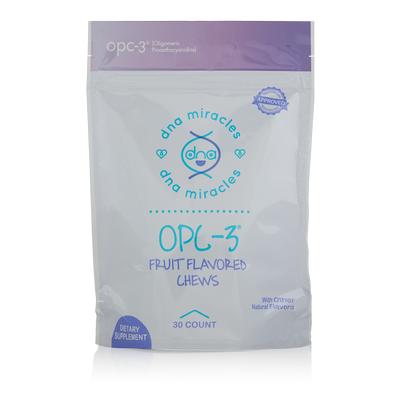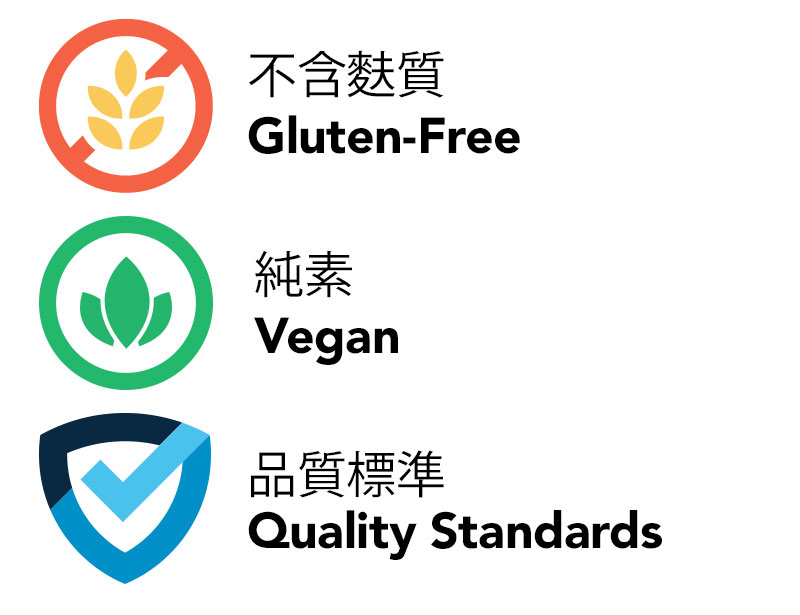「效果令我難以置信,它改變了我的人生!」

益處
- 支援健康膚色
- 支援健康血管功能及血液流動
- 提供抗氧化防護
- 充當自由基清除劑
此產品並不供作診斷、治療或預防任何疾病之用。
產品分類

不含麩質 - 本產品不含可檢測出之麩質*
不含可檢測出之基改成份(GMO) - 本產品不含可檢測出之基因改造生物成份
純素 - 本產品不含動物相關成份
品質標準 - 良好生產規範(GMP)運作與標準化成份
已檢測:重金屬丶微生物污染物丶過敏原丶效力丶純度及特性
*美國食品藥品監督管理局(FDA)將含有少於20PPM麩質的製成產品列為不含麩質
詳細資料
-1115.jpg)
父母和兒科醫生都了解,要確保孩子得到所需營養一點也不容易,其中要攝取重要的抗氧化物就尤其困難。因此,美味可口的DNA奇妙系列OPC-3軟糖絕對是你孩子的必然選擇,讓孩子享受碧容健 ®† 的抗氧化功效。這些具抗氧化功能的軟糖加入了碧容健,即Isotonix OPC-3產品含有的相同成份。研究顯示,這種成份可提供抗氧化防護,並支援健康血管功能和血流,從而為你孩子的健康提供支援。
父母可以很有信心,DNA奇妙系列OPC-3軟糖不但讓孩子享用營養豐富而美味可口的軟糖,更對孩子的健康有益。
全因每個孩子都是奇妙恩典。
†碧容健®為賀發研究機構 (Horphag Research Ltd.) 的註冊商標,此產品受一個或多個美國專利和其他國際專利的保護。
成份
碧容健®
碧 容健是由海岸松樹皮提取的植物萃取物;海岸松樹只生長在法國西南部沿岸的加斯科尼地區。這不受污染的天然環境是海岸松樹的唯一來源。碧容健是天然產品巿場 上受到最廣泛研究的成份之一。獲發表的研究顯示,碧容健對人體有多項益處,抗氧化功效尤其出眾。松樹皮萃取物含有原花色素(OPC)、生物類黃酮和有基酸。
碧容健可充當自由基清除劑,並提供抗氧化防護,因此對孩子有益。
葡萄籽萃取物
葡萄籽萃取物一般提取自紅葡萄(而非白葡萄)的籽,含有大量稱為原花色素(OPC)的複合物,以及具抗氧化功效的多酚類。葡萄籽萃取物提供抗氧化防護,並或有助支援健康血管功能和血液流動,因此對孩子有益。
歐洲藍莓萃取物
歐洲藍莓萃取物提取自歐洲一種普遍矮灌木的果實;這種植物與藍莓非常近似。成熟的莓類萃取物含有稱為花青素的黃酮類色素,它們具有抗氧化功效。研究顯示,歐洲藍莓萃取物支援血液流動和血管功能。歐洲藍莓萃取物可支援健康血液流動,從而促進整體健康,因此對孩子有益。
柑橘生物類黃酮萃取物
生物類黃酮是部份植物含有的抗氧化物,是吸收紫外線輻射的光線過濾器,保護植物裡的DNA和其他重要的大分子。研究發現,生物類黃酮可促進健康血液流動和血管功能。
紅酒萃取物
紅酒萃取物提取自葡萄,提供高抗氧化性能,可作為自由基清除劑,亦可支援血液流動和血管功能。
常見問答
OPC是甚麼?
DNA奇妙系列OPC-3軟糖配方含有生物類黃酮,即生物活性植物複合物。這些生物類黃酮亦稱為原花色素,或簡稱OPC。獲得最廣泛研究的部份OPC包括葡萄籽、紅酒、葡萄皮、歐洲藍莓、柑橘類和松樹皮萃取物(碧容健)。
DNA奇妙系列OPC-3軟糖含有任何致敏原嗎?
DNA奇妙系列OPC-3軟糖是素食產品,不含小麥、大豆、酵母、麩質、人造香料、澱粉、鹽、防腐劑或奶類。
DNA奇妙系列OPC-3軟糖的食用份量是多少?
每天食用一(1)粒,或按照醫護人員指示食用。
我的孩子可以同時使用DNA奇妙系列OPC-3軟糖和DNA奇妙系列益生菌嗎?
可以,兩者可以同時使用。
成人可以食用DNA奇妙系列OPC-3軟糖嗎?
可以!DNA奇妙系列OPC-3軟糖對孩子和成人同樣有益。一粒DNA奇妙系列OPC-3軟糖含有25毫克碧容健,與Isotonix OPC-3每食用份量所含的份量相同。
貯存DNA奇妙系列OPC-3軟糖的最佳方法是甚麼?
把DNA奇妙系列OPC-3軟糖放在密封的袋中。把密封袋貯存於陰涼、乾燥處,如雪櫃或防潮箱內。
食用DNA奇妙系列OPC-3軟糖安全嗎?
DNA奇妙系列OPC-3軟糖安全及不含有害化學物質、防腐劑和酒精。本產品在美國製造,並於經美國食品及藥物管理局檢測的設備生產,符合良好生產規範。顧客對本產品的質量和安全可絕對有信心。
科學
- Adams J. Summary of Biomedical Treatments for Autism. Autism Research Institute Publication. 40 (April), 2007.
- Burton G et al. Vitamin E: Antioxidant activity, biokinetics, and bioavailability. Annual Review Nutrition. 10:357-382, 1992.
- Chovanová Z et al. Effect of polyphenolic extract, Pycnogenol, on the level of 8-oxoguanine in children suffering from attention deficit/hyperactivity disorder. Free Radical Research. 40(9):1003-10, 2006.
- Devaraj S et al. Supplementation with a pine bark extract rich in polyphenols increases plasma antioxidant capacity and alters the plasma lipoprotein profile. Lipids 37:931-4, 2002.
- Diliberto E et al. Multicompartmental secretion of ascorbate and its dual role in dopamine b-hydroxylation. American Journal of Clinical Nutrition. 54(6 Supplement):1163S-72S, 1991.
- Dolske M. et al. A preliminary trial of ascorbic acid as supplemental therapy for autism. Progress in Neuropsycho-pharmacology and Biological Psychiatry. 17(2):765-774, 1993.
- Dvoráková M et al. The effect of polyphenolic extract from pine bark, Pycnogenol on the level of glutathione in children suffering from attention deficit hyperactivity disorder (ADHD). Redox Report. 11(4):163-72, 2006.
- Fine A. Oligomeric proanthocyanidin complexes: history, structure, and phytopharmaceutical applications. Alternative Medicine Review 5:144-51, 2000. Review.
- Fitzpatrick, D., et al. Endothelium-dependent vascular effects of Pycnogenol. Journal of Cardiovascular Pharmacology 32: 509-515, 1998.
- Freedman, J., et al. Select flavonoids and whole juice from purple grapes inhibit platelet function and enhance nitric oxide release. Circulation 103:2792-8, 2001.
- Frei B et al. Ascorbate is an outstanding antioxidant in human blood plasma. Proceedings of the National Academy of Sciences USA. 86(16):6377-6381, 1989.
- Gulati, O. Pycnogenol® in venous disorders: a review. European Bulletin of Drug Research 7: 1-13, 1999.
- Guo Q et al. Electron spin resonance study of free radicals formed from a procyanidin-rich pine ( Pinus maritima ) bark extract, Pycnogenol®. Free Radical Biology Medicine. 7(11-12): 1308-1312, 1999.
- Henning S et al. Glutathione blood levels and other oxidant defense indexes in men fed diets low in vitamin C. Journal of Nutrition. 121:169-175, 1991.
- James S et al. Metabolic biomarkers of increased oxidative stress and impaired methylation capacity in children with autism. American Journal of Clinical Nutrition. 80(6):1611-7, 2004.
- Johnston C et al. Vitamin C elevates red blood cell glutathione in healthy adults. American Journal of Clinical Nutrition. 58(1):103-105, 1993.
- Kidd P Attention deficit/hyperactivity disorder (ADHD) in children: rationale for its integrative management. Alternative Medicine Review. 5(5):402-28, 2000. Review.
- Kim J et al. Effect of select antioxidants on malondialdehyde modification of proteins. Nutrition. 16: 1079-1081, 2000.
- Kirsch M et al. Ascorbate is a potent antioxidant against peroxynitrite-induced oxidation reactions. Evidence that ascorbate acts by re-reducing substrate radicals produced by peroxynitrite. Journal of Biological Chemistry. 275(22):16702-16708, 2000.
- Kuo C et al. Ascorbic acid, an endogenous factor required for acetylcholine release from the synaptic vesicles. Japan Journal of Pharmacology. 30(4):481-492, 1980.
- Lenton K et al. Vitamin C augments lymphocyte glutathione in subjects with ascorbate deficiency. American Journal of Clinical Nutrition. 77(1):189-195, 2003.
- McGinnis W. Oxidative stress in autism. Alternative Therapies in Health and Medicine. 10(6):22-36, 2004. Review.
- Meydani M. Protective role of dietary vitamin E on oxidative stress in ageing. Age. 15:89-93, 1992.
- Monograph. Vaccinium myrtillus (bilberry). Alternative Medicine Review 6:500-4, 2001.
- Nelson A et al. Pycnogenol® inhibits macrophage oxidative burst, lipoprotein oxidation and hydroxyl radical-induced DNA damage. Drug Development and Industrial Pharmacy. 24 (2): 139-144, 1998.
- Nishioka K et al. Pycnogenol, French maritime pine bark extract, augments endothelium-dependent vasodilation in humans. Hypertension Research. 30(9):775-80, 2007.
- Numakawa Y et al. Vitamin E protected cultured cortical neurons from oxidative stress-induced cell death through the activation of mitogen-activated protein kinase and phosphatidylinositol 3-kinase. Journal of Neurochemistry. 97(4):1191-1202, 2006.
- Nuttall S et al. An evaluation of the antioxidant activity of a standardized grape seed extract, Leucoselect. J Clin Pharm Ther 23: 385-89, 1998.
- Packer L et al. Antioxidant activity and biologic properties of a procyanidin-rich extract from pine (Pinus maritima) bark, pycnogenol. Free Radicals in Biology and Medicine. 27:704-24, 1999. Review.
- Paleologos M et al. Cohort Study of Vitamin C Intake and Cognitive Impairment. American Journal of Epidemiology. 148(1):45-50, 1998.
- Rimland B. Vitamin C in the Prevention and Treatment of Autism. Autism Research Review International. 12:3, 1998.
- Rohdewald P. A review of the French maritime pine bark extract (Pycnogenol®), an herbal medication with a diverse clinical pharmacology. International Journal of Clinical and Pharmacology Therapeutics. 40:158-68, 2002. Review.
- Shi, J., et al. Polyphenolics in grape seeds-biochemistry and functionality. J Med Food 6:291-9, 2003. Review.
- Trebatická J et al. Treatment of ADHD with French maritime pine bark extract, Pycnogenol. European Child and Adolescent Psychiatry. 15(6):329-35, 2006.
- Wallerath, T., et al. Resveratrol, a polyphenolic phytoalexin present in red wine, enhances expression and activity of endothelial nitric oxide synthase. Circulation 106:1652-8, 2002.
- Wei Z et al. Pycnogenol enhances endothelial cell antioxidant defense. Redox Report 3: 219-24, 1997.
- Yao Y et al. Altered vascular phenotype in autism: correlation with oxidative stress. Archives of Neurology. 63(8):1161-4, 2006.
評論
顯示 1 - 3 的 3
27/9/2024
而 匿名
專注力不足可立即見效👍👍👍
我的學生服用這產品後,感到效果很好!尤其是對有ADHD的學生就最是顯著!👍
顧客服務部的回覆
27/9/2024
親愛的顧客,感謝您抽出寶貴時間對DNA奇妙系列OPC-3®軟糖發表意見。我們很高興您對產品感到滿意。再次感謝閣下對美安的支持!
超連鎖店主服務部 謹啟
16/9/2020
而 匿名
小朋友很喜歡吃
小朋友很喜歡吃
10/6/2015
而 Li
OPC軟糖, 小孩最愛
因為OPC是軟糖, 我仔好喜歡這味道



